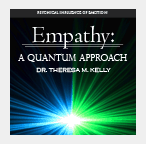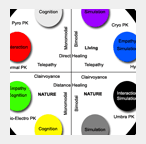Empathy
Parapsychology Articles, Papers and Books
Home > Articles > Psychical Phenomena > Extrasensory Perception > Empathy
![]()
|
| NEWSLETTERS |
| Get the best from QPsychics.com in your inbox! |
|
| PARAPSYCHOLOGY ORGANIZATIONS |
"With confidence in the importance of utilizing the investigative mode of the established sciences in order to inquire into the authenticity and to potentially explain the nature of psychical phenomena."  |
 |
 |
 |
 |
Empathic Simulation
Empathy is the psychical influence of emotion via experient influence over the emotional basis of consciousness and the mental and physiological processes associated with a wide variety of emotional experiences. Empathic simulation has been defined as “a case in which an individual’s emotional experience appears to directly produce a similar emotional experience in someone else without the intervention of the five senses.” In other words, the empathist’s emotional experience produces a similar emotional experience in subjects or vice versa. Via this type of empathy, the subjects and empathist do not “know” the emotional experience of the other participants, nor is the emotional experience “impressed.” In the case of this type of empathy, the empathist does not “know” empathically what the emotional experience of the subjects are, but rather it appears that the emotional experience of the empathist and subjects instantaneously become qualitatively identical. However, reports in regards to this form of tele-empathy suggest exact, or nearly exact, emotional experiences. This type of empathy also appears to be more non-invasive as subjects are typically is unaware that, or do not “know” that, the emotional experience is “not their own,” as it appears to be less intrusive than empathic cognition or impression. The skilled empathist would however be able to identify that the simulated emotional experience originated from him/her if the empathist knowingly shared the emotion with subjects. In other words, the empathist can share his/her own emotional experiences with subjects, or the empathist can evoke the sharing process of the subject’s emotional experience to replace his/her own emotional experience. In the end, I believe the most efficient way to view empathic simulation is as though the emotional experiences have be shared via the exact transmission of the experience from one participant to the other. The most common way in which this type of empathy is utilized is to provide comfort and or motivation. In regards to comfort, if the empathist and subjects find themselves in a situation in which only the empathist feels comfortable or safe (e.g. a lacking of fear), or vice versa, the empathist can share his/her own emotional experience, or fear-neutral emotional episode, with the subjects, whereby non-invasively sharing his/her sense of security and comfort with the subjects. A similar instance of this involves the sharing of the empathists feeling that an action is a “good idea,” possibly due to neutralizing the emotional experiences of the subjects in regards to fear, shame, guilt, etc. This sense of security is shared with the subjects leading the subjects to often bypass their natural tendencies.
(Adapted from the book “Empathy: A Quantum Approach - The Psychical Influence of Emotion” by Theresa M. Kelly, MsD.)
|
|||
Related Articles Suggested Reading
|
|||

